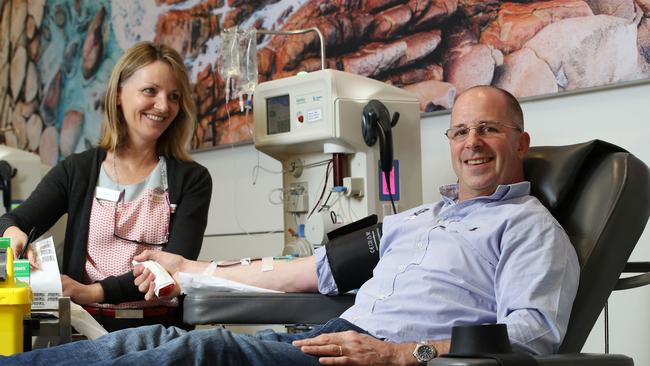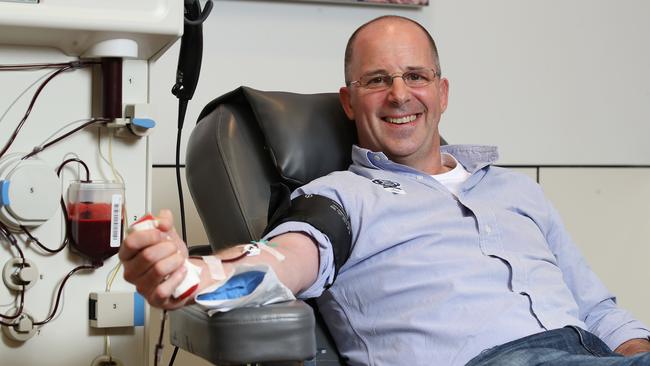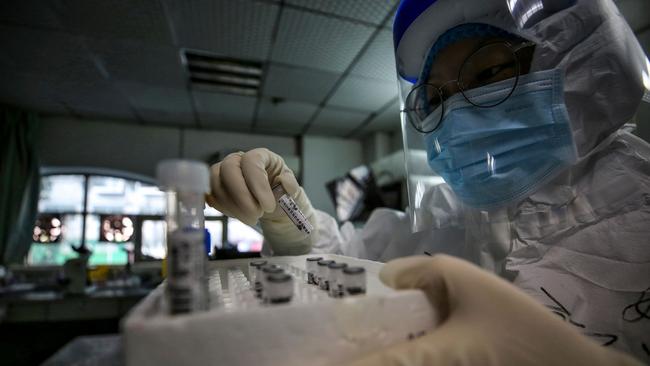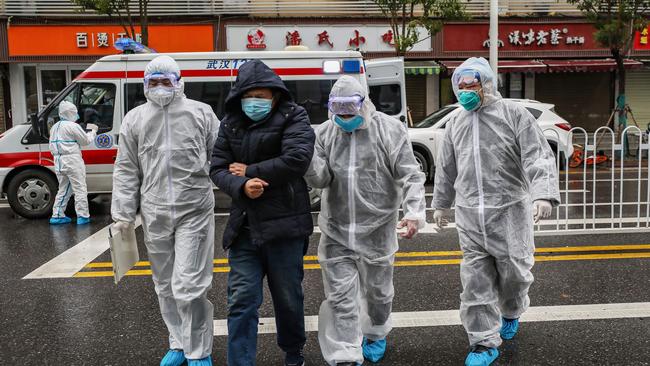Coronavirus NSW: Recovered patients donate plasma for treatment
150 of the 6000 Australians who have recovered from COVID-19 are helping to produce a treatment in the fight against the virus as European scientists discover an explanation for why more men have died from the disease.

NSW
Don't miss out on the headlines from NSW. Followed categories will be added to My News.
- Protest mum reported to cops over beauty service
- All NSW hospitals’ elective surgery wait times revealed
If you are one of the more than 6,000 Australians who have recovered from COVID-19, you have a unique chance to give back to your community and help fight the virus.
The first donors of convalescent plasma – plasma collected from recovered coronavirus patients – gave their donations at Red Cross Lifeblood centres across the country on Monday.
Convalescent plasma is believed to be usable as a treatment for the virus, which has killed 97 Australians.

It comes as a new study reveals more men are dying form coronavirus and scientists in Europe believe they know why.
Warwick Butt, 52, gave up his lunch break to donate his plasma, after being 28 days recovered from the virus.
“My case was mild, but my wife actually suffered for longer than I did,” Mr Butt said.
Mr Butt and his wife had returned from overseas when Mrs Butt was tested positive to the virus. Three days later, Warwick had also tested positive and the family home was turned into an isolation ward.
“My wife stayed upstairs, and I was the only one that ferried food to her. She was in the red zone effectively,” Mr Butt said.
“We had certain rooms where we said the parents can go and not the kids, and vice versa,” he said.

Mr Butt said the process was fairly painless, and the least he could do to help in the fight against the virus.
“This is the least we can do, anything we can do to help the cause … I’m not a frontline health worker, but this is one way I can contribute,” Mr Butt told The Daily Telegraph from his donation chair.
“I was more than happy to do it, anything that we can do to combat this thing then I’m all for it," he said.
“It was very easy, very thorough. Everything went through smoothly and there was no discomfort at all really.”
The father of two said this won’t be his last donation. As plasma can be donated more frequently than blood, he is hoping to come back once a week.
So far around 150 people who have recovered from coronavirus have signed up, totalling almost 200 donations.
Director of Medical Services at Lifeblood Dr James Daly said that a much higher number of donors is needed for the fight.
“The plasma in people who have recovered from the illness contains antibodies, which are the immune systems way of fighting off the virus,” Dr Daly said.
“If we can collect the plasma including those antibodies and transfuse it into somebody who is suffering a more severe illness or earlier on, the hope is it can shorten the duration and reduce the severity of the illness,” he said.
Lifeblood is calling for anyone who has been recovered for 28 days to come forward and donate.
“We are looking for about 800 donors to make the first batch of the hyperimmune globulin, which is a concentrate of the antibodies.
“But as a start we are looking for 500 donations to use their plasma directly for transfusion to patients.”
While Mr Butt was lucky to have a mild case of the virus, more men are dying of coronavirus than women, and scientists in Europe think they know why.
Men have higher amounts of an enzyme called angiotensin-converting enzyme (ACE2) in their blood than women, heart researchers in the Netherlands, Norway and Cyrus have found.
ACE2 is a receptor on the outside of cells that the COVID-19 virus uses to infect healthy cells.
It is widely distributed in tissues throughout the body including the lungs, veins, heart, kidney, and is found in particularly high levels in the testes.
In Australia, 56 per cent of the deaths from COVID-19 have been among males and men are slightly more likely to contract the virus (50.6 per cent of cases).
Overseas the gender divide has been much greater with 70 per cent of COVID-19 deaths in Italy occurring among males, while in New York men were almost twice as likely as women to die from the virus.

In China, men made up 64 per cent of the country’s deaths, while in Germany, they accounted for 62 per cent. The World Health Organisation said globally 60 per cent of deaths have occurred in men while only 47 per cent of virus cases occurred in men.
In the new study, published in the European Heart Journal researchers measured ACE2 concentrations in blood samples taken from two groups of over 3500 heart failure patients from 11 European countries.
The study had started before the coronavirus pandemic and did not include patients with COVID-19.
“When we found that one of the strongest biomarkers, ACE2, was much higher in men than in women, I realised that this had the potential to explain why men were more likely to die from COVID-19 than women,” said Iziah Sama, a doctor at UMC Groningen who co-led the study.
The study found that widely used blood pressure medications called ACE inhibitors did not lead to higher ACE2 concentrations.

This is important because earlier on in the pandemic there had been some concern these drugs might make COVID-19 worse.
This study concludes they do not increase the COVID-19 risk for people taking them and heart specialists have been urging their patients to continue taking the medications.
It comes as Chinese researchers found traces of COVID-19 in semen but they don’t know yet whether the virus can be sexually transmitted.
Researchers at the Shangqiu Municipal Hospital tested the semen of 38 COVID-19 patients and found 15.8 per cent of the virus in their semen.
More than one in four patients at the acute stage of the infection had the virus detected in their semen and 8.7 per cent of those who were recovering from the virus also had the virus present in semen, the study published in the Journal of the American Medical Association found.
“Therefore, to avoid contact with the patient’s saliva and blood may not be enough, since the survival of SARS-CoV-2 in a recovering patient’s semen maintains the likelihood to infect others,” the authors conclude.
However, they say the detection of the virus in the semen does not mean the disease can be sexually transmitted, further research is needed to determine that.
Originally published as Coronavirus NSW: Recovered patients donate plasma for treatment


